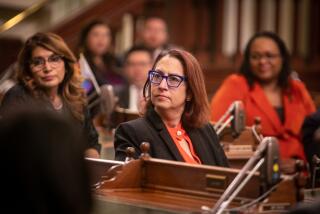Moderates could enhance image of state Legislature
SACRAMENTO — The next class of the Legislature will be stocked with a new variety of lawmaker, the product of a new political order intended to foster moderation, compromise and foresight in an institution not known for such things.
Able to serve longer in one house under revamped term limits, the newly elected will have time to develop expertise. They may well be more accountable to voters because their seats will no longer be safe as they were when districts were gerrymandered to maintain the status quo.
And their moderation, born of more balanced districts and nonpartisan primaries, can serve as a check on Democrats’ emerging supermajorities in both houses. That historic development would allow Democrats to sidestep Republicans on tax votes and in placing proposals on the statewide ballot.
Taken together, the changes have the potential to rehabilitate the image of the Legislature, which has taken a beating during years of partisan gridlock, protracted budget wars and short-term solutions that kicked problems down the road.
Ambitious legislators will no longer seek to simply “get a couple of bills passed and create the impression they did something,” said Bob Hertzberg, a former Assembly speaker who pushed for the changes. The new rules, he said, force lawmakers to “think longer term, and not just engage in the optics of politics.”
The effect of the changes will be felt most in the Assembly. Nearly half of the lower house will be freshmen — the largest number since 1934. The state Senate will welcome 10 new members, all but one of whom hails from the Assembly.
The newcomers will be the first to operate under new rules that allow lawmakers to serve their entire tenure — up to 12 years — in one house. Under California’s old term limits, enacted 22 years ago, legislators could have three terms in the Assembly and two in the Senate, for a total of 14 years.
In that system, political analysts said, lawmakers had lost sight of how to govern. Short tenures left them reliant on lobbyists for guidance on complex issues and prompted a perpetual scramble for higher office and cash to fund the next campaign. Lobbyists exercised extraordinary power as both campaign donors and policy advisors, earning a nickname as the “Third House.”
Focus will be critical for the new lawmakers as they tackle Gov. Jerry Brown’s ambitious agenda. It includes implementing President Obama’s healthcare law, overhauling the state’s water system, amending environmental regulations to encourage economic growth and promoting California’s high-speed rail project.
Many of those legislators will have some freedom to operate independently of their caucuses. The nonpartisan primary system, which allows the top-two finishers to face off in the general election, is expected to ease caucus leaders’ grip.
The bosses prize party discipline to deliver critical votes. In recent years, deals on the state budget have been hammered out by the “Big Five,” a group composed of those leaders and the governor.
Now, “if it plays out the way people are expecting, you will have a little bit less of a notion that … top leaders make all the decisions,” said Raphael Sonenshein, who heads the Pat Brown Institute of Public Affairs at Cal State L.A.
In Tuesday’s election, 20 races pitted two candidates of the same party against each other. Contenders in those districts had to please voters beyond their own parties.
In Northern California wine country, Democrat Marc Levine bested incumbent Assemblyman Michael Allen (D-Santa Rosa) in a tight contest, though some ballots remain uncounted. Allen had attacked Levine for campaigning before Republican groups. Levine championed an overhaul of the state’s public pension system strongly opposed by labor groups that backed Allen.
“Voters are looking for leaders with solutions to the challenges facing California,” Levine said in an interview.
Some Republicans also shifted toward the political middle.
In 2010, Kristin Olsen of Modesto won an Assembly seat after she joined her GOP colleagues in signing a no-tax pledge. This year, running against a Democrat in a newly drawn district, she declined to renew the vow, saying it encumbers lawmakers from showing leadership.
Backers of the new political system are optimistic about the fruits it may bear.
“With more time,” said Kathay Feng, executive director of California Common Cause, “we hope these new legislators will develop a greater personal knowledge of issues, deepen relations with legislators on both sides of the aisle and be able to resolve some of the long-term challenges that California faces.”
For the latest California election results, go to latimes.com/electionresults and latimes.com/socalresults.
More to Read
Sign up for Essential California
The most important California stories and recommendations in your inbox every morning.
You may occasionally receive promotional content from the Los Angeles Times.











